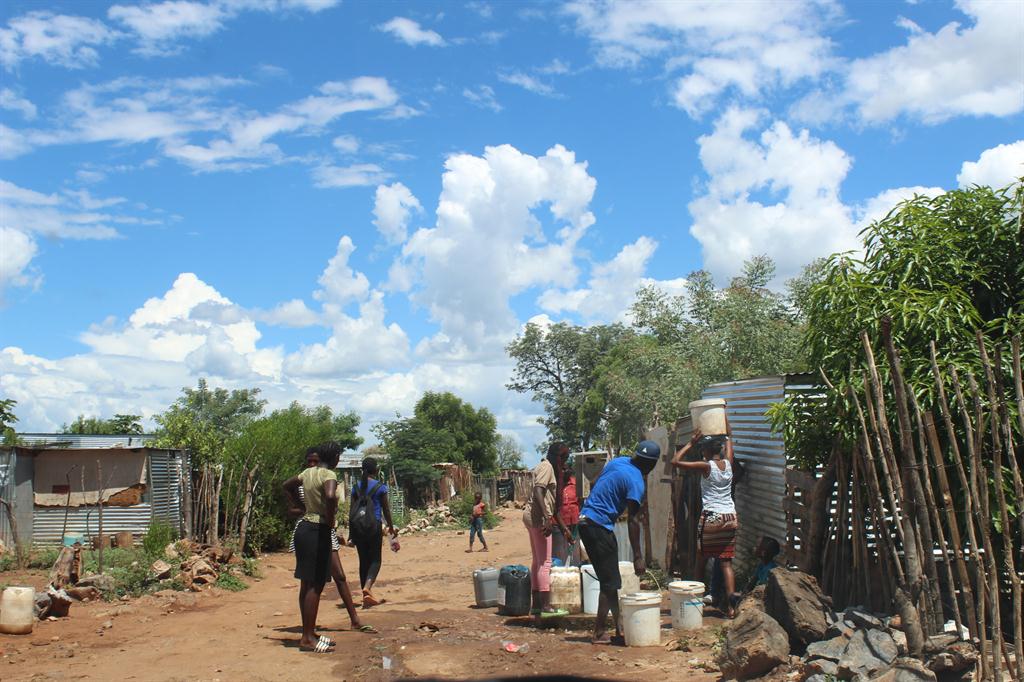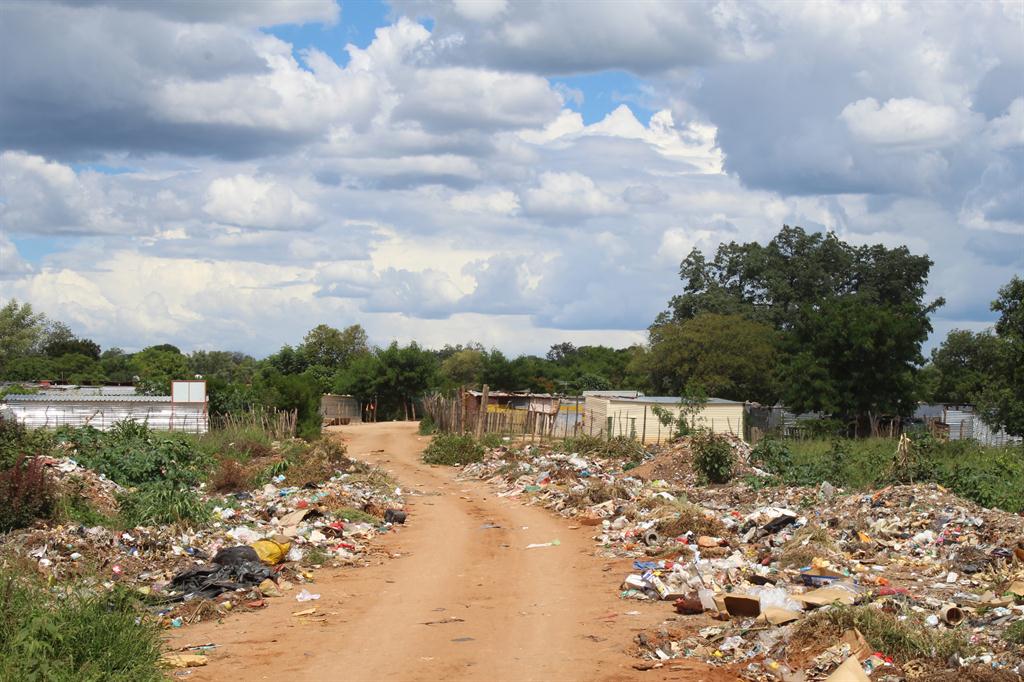Kuvukiland time bomb
A hygiene disaster looms large in Tsumeb's Kuvukiland informal area, where the number of shack dwellers has escalated from ten to anywhere between 6 500 and 15 000, while they have no services to speak of.
Kuvukiland, Tsumeb's largest informal area, has grown from a mere ten inhabitants in 2010 to anywhere between 6 500 and 15 000 people, a Namibian Sun investigation has revealed.
These thousands of shack dwellers have no access to electricity or a sewerage system, leaving them to wallow in filth and poverty.
Earlier this week, Namibian Sun reported how a number of people from Kuvukiland spend their days at the town's dumpsite, where they pick up food scraps and discarded items that they can sell.
According to the Kuvukiland socioeconomic survey that was conducted in September 2017, there were 6 507 people living in the area, 64% of them female.
A spokesman for the Kuvukiland B community, Philip Nashilongo, claims that this figure is much higher.
Nashilongo says when they conducted their own survey over a period of six months about a year ago, the number of people in the three Kuvukiland settlements stood at around 15 000 and continued to grow.
Kuvukiland was established at the end of 2010 when ten people, who desperately needed a place to call home, started to erect shacks that were said at the time to be illegal. The land belonged to Weatherly Mining Namibia until 2016, when the company gave it to the Tsumeb municipality to develop.
Over the years, the number of people living in Kuvukiland has grown exponentially. Nashilongo says uncertainty about ownership of the land is the residents' main concern. According to him they erected shacks at Kuvukiland because they had no other option, as renting in Tsumeb had become too expensive over the years.
“We have been working in Tsumeb for many years but we could not get land from the municipality and it was on that basis we decided to establish Kuvukiland. First we were just ten and now it's thousands of people and we all want land.”
Nashilongo says they are grateful to the municipality for providing them with water, but they also need electricity and sanitation services. “It is dark at night here and we are forced to use the bushes. We cannot make our own toilets because the plots are small and the terrible smell from toilets will not be good among neighbours,” he says. Residents of Kuvukiland A and B have access to three public water points, as four others are not in a working condition. Kuvukiland C residents rely on water trucks that the municipality sends to the area at weekends. Nashilongo says the demand for water is high in Kuvukiland because of the large families who live there. “If you visit these community taps early in the morning and after 17:00, you will see long queues because people from one house can come with up to ten buckets and this means that you will have to wait long for your turn.” Nashilongo says they do not have municipal refuse bins in Kuvukiland, which is why they dump their rubbish in the veld, where it lies uncollected. “The heaps of rubbish you see around Kuvukiland have been there for many years and we have been asking the municipality for a very long time to come and collect it but no positive response has come our way,” Nashilongo says. Regarding the formalisation of Kuvukiland, it has been asked whether the community would be able to afford the municipal rates, because the area is mountainous and expensive to service. When contacted for comment, Tsumeb town council spokesperson Stella Imalwa-Nangolo said the concerns raised by the residents of Kuvukiland were genuine, and efforts were being made to address them. Imalwa-Nangolo said the establishment of Kuvukiland was a consequence of the town's growth, as people flocked to Tsumeb hoping for a better life. “On Monday we had a community meeting at Kuvukiland where the new councillors were introduced to them and we also talked about future developments. Issues were raised and we took note,” she said. Imalwa-Nangolo stressed that the council was making positive strides in terms of getting partners who would assist in the planning and mapping of Kuvukiland.
The cost of servicing the rocky area, and the resulting high municipal rates, were raised at Monday's meeting, she added. She said the council was aware of the problem and people living in the rocky area near the national road would be moved to a better location. Imalwa-Nangolo admitted that water provision remained a challenge despite the municipality's efforts.
KENYA KAMBOWE
These thousands of shack dwellers have no access to electricity or a sewerage system, leaving them to wallow in filth and poverty.
Earlier this week, Namibian Sun reported how a number of people from Kuvukiland spend their days at the town's dumpsite, where they pick up food scraps and discarded items that they can sell.
According to the Kuvukiland socioeconomic survey that was conducted in September 2017, there were 6 507 people living in the area, 64% of them female.
A spokesman for the Kuvukiland B community, Philip Nashilongo, claims that this figure is much higher.
Nashilongo says when they conducted their own survey over a period of six months about a year ago, the number of people in the three Kuvukiland settlements stood at around 15 000 and continued to grow.
Kuvukiland was established at the end of 2010 when ten people, who desperately needed a place to call home, started to erect shacks that were said at the time to be illegal. The land belonged to Weatherly Mining Namibia until 2016, when the company gave it to the Tsumeb municipality to develop.
Over the years, the number of people living in Kuvukiland has grown exponentially. Nashilongo says uncertainty about ownership of the land is the residents' main concern. According to him they erected shacks at Kuvukiland because they had no other option, as renting in Tsumeb had become too expensive over the years.
“We have been working in Tsumeb for many years but we could not get land from the municipality and it was on that basis we decided to establish Kuvukiland. First we were just ten and now it's thousands of people and we all want land.”
Nashilongo says they are grateful to the municipality for providing them with water, but they also need electricity and sanitation services. “It is dark at night here and we are forced to use the bushes. We cannot make our own toilets because the plots are small and the terrible smell from toilets will not be good among neighbours,” he says. Residents of Kuvukiland A and B have access to three public water points, as four others are not in a working condition. Kuvukiland C residents rely on water trucks that the municipality sends to the area at weekends. Nashilongo says the demand for water is high in Kuvukiland because of the large families who live there. “If you visit these community taps early in the morning and after 17:00, you will see long queues because people from one house can come with up to ten buckets and this means that you will have to wait long for your turn.” Nashilongo says they do not have municipal refuse bins in Kuvukiland, which is why they dump their rubbish in the veld, where it lies uncollected. “The heaps of rubbish you see around Kuvukiland have been there for many years and we have been asking the municipality for a very long time to come and collect it but no positive response has come our way,” Nashilongo says. Regarding the formalisation of Kuvukiland, it has been asked whether the community would be able to afford the municipal rates, because the area is mountainous and expensive to service. When contacted for comment, Tsumeb town council spokesperson Stella Imalwa-Nangolo said the concerns raised by the residents of Kuvukiland were genuine, and efforts were being made to address them. Imalwa-Nangolo said the establishment of Kuvukiland was a consequence of the town's growth, as people flocked to Tsumeb hoping for a better life. “On Monday we had a community meeting at Kuvukiland where the new councillors were introduced to them and we also talked about future developments. Issues were raised and we took note,” she said. Imalwa-Nangolo stressed that the council was making positive strides in terms of getting partners who would assist in the planning and mapping of Kuvukiland.
The cost of servicing the rocky area, and the resulting high municipal rates, were raised at Monday's meeting, she added. She said the council was aware of the problem and people living in the rocky area near the national road would be moved to a better location. Imalwa-Nangolo admitted that water provision remained a challenge despite the municipality's efforts.
KENYA KAMBOWE





Comments
Namibian Sun
No comments have been left on this article